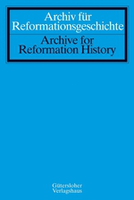
ARCHIV FUR REFORMATIONSGESCHICHTE-ARCHIVE FOR REFORMATION HISTORY
Scope & Guideline
Exploring the Depths of Reformation History
Introduction
Aims and Scopes
- Theological Developments:
The journal emphasizes the theological discourse during the Reformation, exploring how various reformers articulated their beliefs and how these beliefs influenced religious practices and community life. - Cultural Interactions:
It investigates the interplay between the Reformation and broader cultural movements, such as humanism and art, examining how these interactions shaped the Reformation's impact on society. - Regional Studies:
The journal publishes research focusing on specific geographic locales and their unique experiences during the Reformation, highlighting the diverse manifestations of reformative thought across Europe. - Historical Narratives:
It seeks to reconstruct historical narratives through the analysis of primary sources, including letters, sermons, and institutional records, to better understand the lived experiences of individuals during the Reformation. - Inter-denominational Relations:
The journal explores the relationships and conflicts between different Christian denominations that emerged during the Reformation, analyzing how these interactions influenced theological and political landscapes.
Trending and Emerging
- Confessionalization and Identity:
Recent papers increasingly explore the concept of confessionalization, examining how religious identities were formed and contested during and after the Reformation, highlighting its relevance in contemporary discussions about religious identity. - Interdisciplinary Approaches:
There is a growing trend towards interdisciplinary research, integrating insights from sociology, anthropology, and cultural studies, which enriches the understanding of the Reformation's impact on society. - Migration and Refugee Studies:
The focus on migration and the experiences of refugees during the Reformation period has gained prominence, reflecting broader societal concerns about displacement and identity in historical contexts. - Gender Studies within Reformation Contexts:
Emerging themes in gender studies are becoming more prevalent, as scholars examine the roles and experiences of women during the Reformation, contributing to a more nuanced understanding of gender dynamics in religious transformations.
Declining or Waning
- Witchcraft and Superstition:
While witchcraft and superstition were once significant topics, recent publications show a decreasing trend in their exploration, suggesting a move towards more pressing theological and social issues of the Reformation period. - Political Dimensions of the Reformation:
Although political aspects of the Reformation were previously a focal point, there has been a noticeable decline in articles analyzing the political implications, indicating a possible shift towards more theological and cultural studies. - Local Reformation Movements:
Research focusing on localized or minor reformative movements appears to be less frequent, with the journal favoring broader, more impactful narratives of the Reformation.
Similar Journals

NORTHERN HISTORY
Illuminating Cultural Transformations of the NorthNorthern History is a distinguished academic journal published by Routledge Journals, Taylor & Francis Ltd, focusing on the exploration of historical narratives, themes, and developments in the northern regions of the United Kingdom and beyond. Established in 1966, this journal has been a pivotal platform for scholars aiming to advance the understanding of historical processes and cultural transformations in a northern context. Though currently categorized in Q4 of the History quartile for 2023, it provides unique insights that have contributed to a diverse range of inquiries and debates within the field, ranking #1143/1760 in Scopus for Arts and Humanities History. While Northern History is not an open-access journal, it remains vital for researchers and students seeking to enrich their knowledge and engage with current scholarly discussions in historical studies. Housed in the United Kingdom, this journal is committed to the dissemination of quality research and serves as an essential resource for understanding the complexities of history in the northern realms.

ARCHIVIO STORICO ITALIANO
Fostering Critical Dialogues in Historical ResearchARCHIVIO STORICO ITALIANO is a distinguished scholarly journal published by CASA EDITRICE LEO S OLSCHKI, based in Florence, Italy. Established in the early 20th century, this journal has been pivotal in the dissemination of historical research, covering a broad spectrum of topics within the field of history. With an ISSN of 0391-7770 and an E-ISSN of 2036-4660, it aims to contribute to the understanding of Italian history and its global impacts. Although the journal operates within a Q4 quartile in the History category and ranks #1421 out of 1760 in the Arts and Humanities according to Scopus metrics, it continuously strives to enhance its academic stature and broaden its readership. While currently not available through Open Access, ARCHIVIO STORICO ITALIANO remains an invaluable resource for historians, researchers, and students seeking to delve into Italian historical narratives and scholarly debates. The journal invites contributions that advance historical scholarship and foster critical discussions, making it an essential platform for anyone passionate about history.
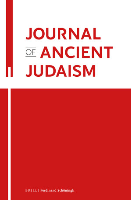
Journal of Ancient Judaism
Fostering Scholarly Dialogue on Ancient Jewish ThoughtThe Journal of Ancient Judaism is an esteemed academic publication focusing on the dynamic field of religious studies, particularly the historical and cultural contexts of ancient Judaism. Published by BRILL, a reputable international publisher known for its scholarly contributions, this journal is dedicated to advancing the study of ancient Jewish texts, traditions, and their socio-political environments. With an ISSN of 1869-3296 and an E-ISSN of 2196-7954, the journal has established its footprint in the scholarly community, supported by its ranking in the Q3 quartile for Religious Studies in 2023 and a Scopus rank of #371 out of 644 in its category. The content showcased in this journal is vital for researchers, professionals, and students alike, offering peer-reviewed articles that contribute to the broader understanding and appreciation of ancient Jewish heritage and its influence on contemporary religious thought. With a timeline spanning from 2015 to 2024, the journal aims to facilitate rigorous academic discourse and provide open access to vital research findings, fostering a deeper engagement with the complexities of ancient Judaism.
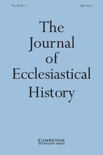
JOURNAL OF ECCLESIASTICAL HISTORY
Illuminating the Past: Religion's Role in SocietyJOURNAL OF ECCLESIASTICAL HISTORY, published by Cambridge University Press, serves as a vital platform for scholarly inquiry into the historical dimensions of ecclesiastical studies, examining the intersections of religion, society, and culture from 1950 to present and projected through 2024. With an ISSN of 0022-0469 and E-ISSN 1469-7637, this journal is recognized within the academic community, categorized in the Q3 quartile in both History and Religious Studies for 2023. Although it does not offer open access, the journal's commitment to rigorous peer-reviewed research and its publication of original articles contribute significantly to the understanding of ecclesiastical history. Scholars and students alike can benefit from its rich discussions and analyses, reinforcing the journal's importance in fostering relevant debates in the fields of History and Religious Studies. Located at Edinburgh Building, Shaftesbury Rd, CB2 8RU Cambridge, England, the journal continues to attract contributions from leading experts, ensuring its role in disseminating high-quality research.
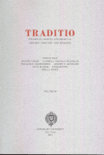
TRADITIO-STUDIES IN ANCIENT AND MEDIEVAL HISTORY THOUGHT AND RELIGION
Unveiling the Depths of Historical Narratives and BeliefsTRADITIO - Studies in Ancient and Medieval History, Thought and Religion is a distinguished academic journal published by Cambridge University Press, dedicated to the exploration and analysis of historical, philosophical, and religious narratives from ancient and medieval periods. The journal's ISSN is 0362-1529 and its E-ISSN is 2166-5508. Renowned for its rigorous scholarship, it enjoys a notable standing in the academic community, reflected in its 2023 category quartiles which place it in the second and third tiers across critical fields such as Literature and Literary Theory, Philosophy, Religious Studies, and Visual Arts and Performing Arts. With its comprehensive scope that encompasses multidisciplinary approaches, TRADITIO provides an essential platform for researchers, academics, and students alike to engage deeply with the complexities of historical thought and cultural practices. Although the journal operates within the traditional subscription model, its significance is underscored by impressive Scopus rankings, indicating its high visibility and impact within the arts and humanities sectors. We invite you to discover the richness of ancient and medieval studies through the pages of TRADITIO.

Journal of Jesuit Studies
Exploring the Legacy of Jesuit ThoughtWelcome to the Journal of Jesuit Studies, a premier scholarly outlet dedicated to advancing the understanding of Jesuit history, culture, and thought. Published by BRILL, this esteemed journal has maintained an Open Access format since 2014, allowing unrestricted access to critical research ensuring that findings can reach a wider audience. Based in the Netherlands, the journal has consistently achieved a commendable ranking of Q2 in both History and Religious Studies as of 2023, demonstrating its strong impact and relevance in these fields. With Scopus rankings placing it in the 74th percentile among peers, the Journal of Jesuit Studies serves as an essential platform for scholars, professionals, and students to explore and discuss the multifaceted legacy of the Jesuits from 2014 to 2024. Its commitment to interdisciplinary dialogue further solidifies its position as a valuable resource for those engaged with this rich historical tradition.
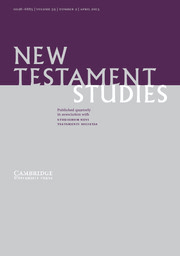
NEW TESTAMENT STUDIES
Cultivating Critical Discourse on Sacred TextsNEW TESTAMENT STUDIES is a prestigious academic journal published by Cambridge University Press, dedicated to the advanced study of the New Testament and its historical context. With an ISSN of 0028-6885 and an E-ISSN of 1469-8145, this journal has established itself as a leading resource in the fields of History and Religious Studies, currently holding a Q1 ranking in both categories as of 2023. With a remarkable convergence of scholarly discourse from 1954 to 2024, the journal is noted for its rigorous peer-reviewed articles that contribute significantly to the understanding of early Christian texts. Although not an open-access publication, it provides essential access options through academic libraries, ensuring that researchers, professionals, and students alike can engage with its high-impact content. With a Scopus ranking placing it in the 80th percentile in both Religious Studies and History, NEW TESTAMENT STUDIES is an invaluable outlet for innovative research and critical scholarship that shapes contemporary biblical studies.
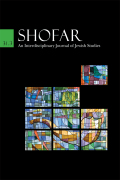
Shofar-An Interdisciplinary Journal of Jewish Studies
Unveiling the Rich Tapestry of Jewish ScholarshipShofar: An Interdisciplinary Journal of Jewish Studies, published by Purdue University Press, is a prominent peer-reviewed journal that engages with the diverse and rich tapestry of Jewish studies through interdisciplinary approaches. With a focus on cultural studies, history, and religious studies, the journal has established itself within the academic community, achieving significant recognition evidenced by its Q3 ranking in these disciplines as of 2023. Researchers and scholars in the field will find valuable insights and innovative discussions that push the boundaries of traditional scholarship. Though currently not open access, Shofar offers an enriching forum for scholarly discourse that fosters a deeper understanding of Jewish identity, history, and culture, making it an essential resource for professionals and students alike. The journal's ISSN is 0882-8539, while its E-ISSN is 1534-5165. It is operational from 2014 to 2024 and is located in the United States.

ZEITSCHRIFT FUR THEOLOGIE UND KIRCHE
Advancing theological discourse with scholarly rigor.ZEITSCHRIFT FUR THEOLOGIE UND KIRCHE is a distinguished academic journal published by J C B MOHR, renowned for contributing to the field of Religious Studies. With its ISSN 0044-3549 and E-ISSN 1868-7377, this journal has been serving scholars and practitioners since its first publication in 2002 and continues to be relevant through 2024. The journal holds a Q2 ranking in the 2023 category of Religious Studies, placing it in the top half of its field, and it is positioned at rank #414 out of 644 in Scopus's Arts and Humanities rankings, highlighting its importance and growing influence in the academic community. Although the journal is not open access, it features a variety of scholarly articles that foster discourse and advancements in theology and ecclesiastical research. Researchers and students alike will find an invaluable resource in ZEITSCHRIFT FUR THEOLOGIE UND KIRCHE, where innovative theological thought meets rigorous academic examination in an accessible format.
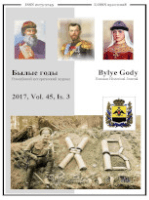
Bylye Gody
Illuminating Contemporary Issues through Historical LensBylye Gody is an esteemed academic journal published by Cherkas Global Univ Press, specializing in the fields of history and political science. With an ISSN of 2073-9745 and an E-ISSN of 2310-0028, this open-access journal has been serving the global academic community since 2006, ensuring unrestricted access to high-quality research. Based in Slovakia, it has garnered a significant reputation, achieving a prestigious Q1 category in History and a Q3 category in Political Science and International Relations as of 2023. Its Scopus rankings further underscore its impact, placing it in the 87th percentile within the arts and humanities, while also making a mark in the social sciences. With a wide range of scholarly articles covering diverse aspects of historical and political discourse, Bylye Gody aims to foster academic dialogue and provide insights into contemporary global challenges. Researchers, professionals, and students alike are invited to explore its rich repository of knowledge that spans from 2012 to 2024, and contribute to the ongoing conversations in these critical fields.